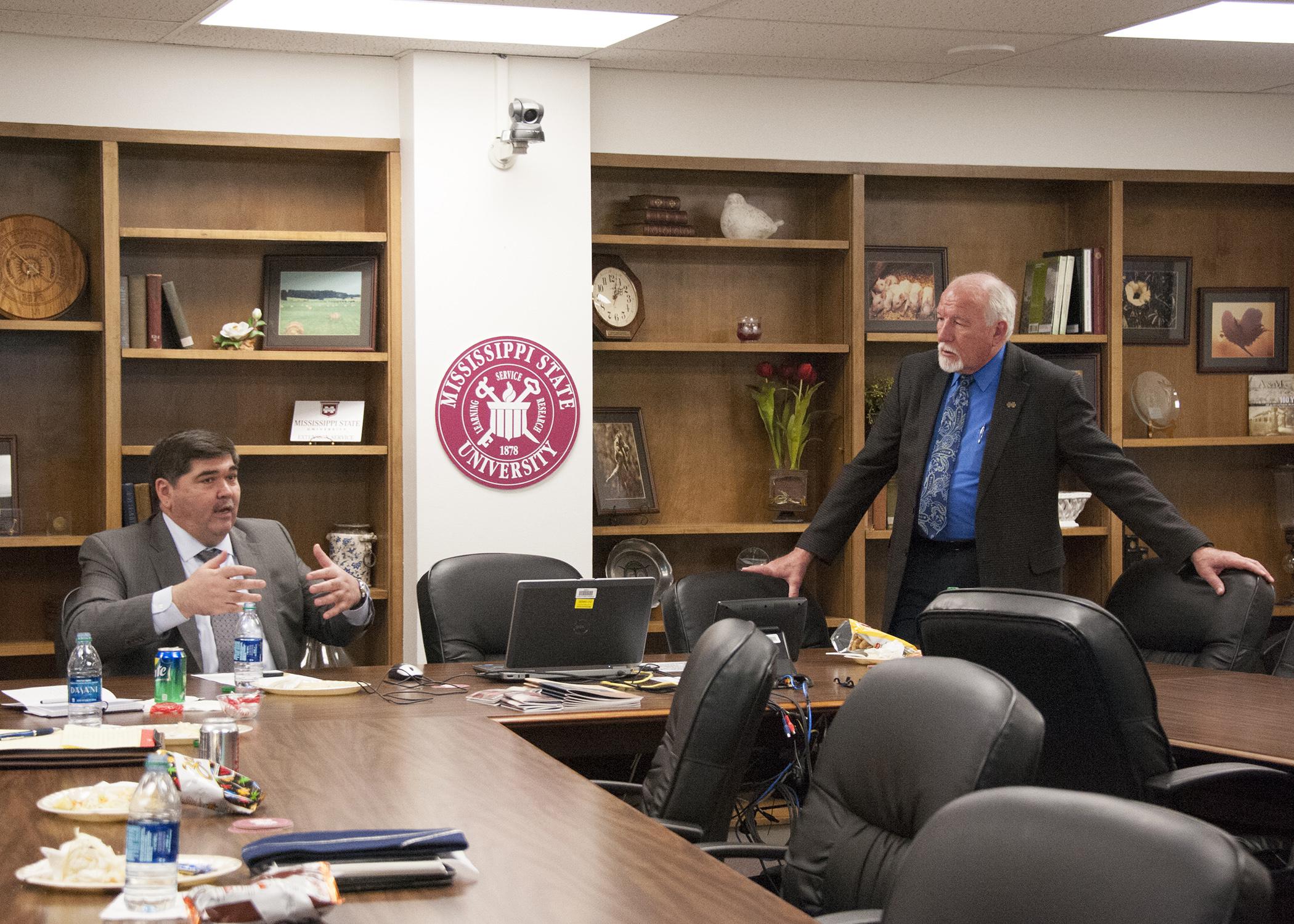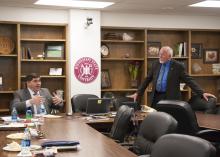Information Possibly Outdated
The information presented on this page was originally released on April 16, 2015. It may not be outdated, but please search our site for more current information. If you plan to quote or reference this information in a publication, please check with the Extension specialist or author before proceeding.
Uzbekistan ambassador to U.S. visits MSU campus
MISSISSIPPI STATE, Miss. -- The Mississippi State University campus was one of several stops in the Magnolia State for the ambassador of Uzbekistan to the United States Wednesday as leaders from each nation seek to strengthen their partnership.
H.E. Bakhtiyar Gulyamov, Ambassador Extraordinary and Plenipotentiary of the Republic of Uzbekistan to the United States, and Adjutant General of Mississippi Augustus Collins met with university administrators to discuss potential university alliances between Uzbekistan and MSU. They also heard a presentation from MSU Extension cotton specialist Darrin Dodds regarding cotton research.
It would not be the first time the university and republic have worked together. Bill Herndon, associate vice president of the MSU Division of Agriculture, Forestry and Veterinary Medicine, said MSU was part of a federally funded economic education and outreach project during the mid- and late 1990s in Uzbekistan after the fall of the Soviet Union in 1991.
Herndon said all colleges and services in the division believe that high quality research and education is global in scope.
“It’s important that we reinitiate this relationship with Uzbekistan,” Herndon said. “There are a lot of similarities in our agricultural backgrounds with cotton being a major part of our histories. This is an opportunity to collaborate with them again, not only in agriculture, but in the broad spectrum of science and technology.”
Uzbekistan also has established ties to Mississippi on the state level. In 1991, the National Guard Bureau established the State Partnership Program. Collins said the program creates security partnerships between American states and countries around the world. Mississippi’s partner country is Uzbekistan.
“We have had a relationship with the Republic of Uzbekistan since 2012 that has been very good,” Collins said. “Up to this point, it has been primarily a military-to-military type exchange. We want to expand that to some civilian exchanges, so I invited the ambassador to come to Mississippi.
“One of the things that I always knew, but know even better now, is that we have some great colleges and universities in this state,” Collins added. “We want to see if there’s an opportunity the university might have to partner with the country of Uzbekistan.”
In 2010, Uzbekistan signed a Bilateral Science and Technology agreement with the United States, which strengthens political relationships between the two countries and promotes initiatives including science education and sustainable economic growth. Gulyamov said working with universities in America with backgrounds in agricultural and scientific research will be crucial to his country’s future success in those areas.
“We came here not only to discuss our military cooperation but to enhance our cooperation in other areas as well, including the areas of science, research and education, which are very important to Uzbekistan,” Gulyamov said. “We have to introduce new ways of rebuilding our agriculture sector. This agreement is focused on renewable energy, healthcare and agriculture.
“I have proposed to the universities and research centers to spread this information to the education centers countrywide,” Gulyamov added. “My aim is to bring the state of Mississippi and Uzbekistan closer together in order to establish mutually beneficial cooperation.”
Gulyamov and Collins also met with state economic development and elected officials during the ambassador’s visit to Mississippi.



